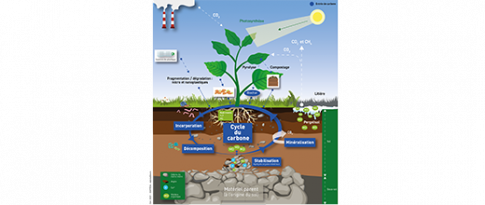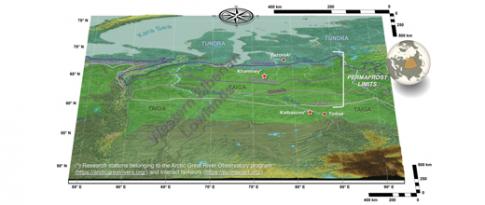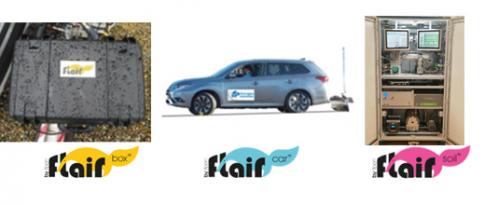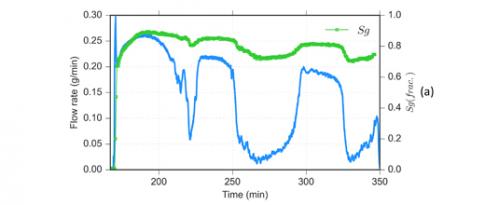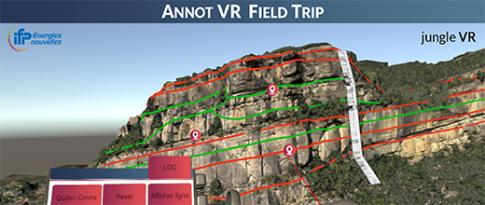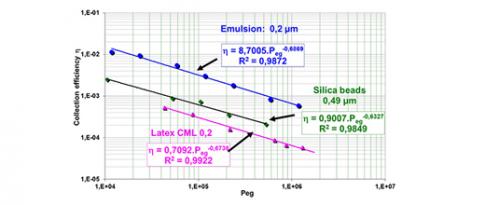14.12.2021
15 minutes of reading

As confirmed by the recent IPCC report, the energy and ecological transition is more essential than ever to tackle global warming and move towards sustainable development, shifting from a carbon-based economy to carbon neutrality by 2050.
IFPEN’s Earth Sciences and Environmental Technologies division is a key player in this ambition. Building on its experience in the oil and gas sector, it is evolving and channeling its expertise to support the development of innovations that will provide solutions to societal and industrial challenges related to energy and climate. To this end, the division relies on a knowledge basis that enables it to characterize, understand and model the soil, the subsurface and the fluids that flow through it. It also relies on many laboratory facilities specializing in a broad range of fields, including geochemistry and gas analysis, complex fluid transfer in porous media, thermodynamics and materials characterization.
The division thus successfully combines multi-scale characterization (from laboratory to field) with the development of models and simulations capable of numerically reproducing the behavior of the media studied. This characterization-modeling combination is now complemented by data science approaches. With its experimental capabilities, the division conducts a variety of research projects ranging from the understanding of systems and mechanisms to the development of technological objects.
In this issue of Science@ifpen, you will find an overview of the subjects tackled by the division's researchers, illustrating significant advances in research themes in recent years and the invaluable contributions of a multidisciplinary approach, whether within IFPEN itself or via collaborative projects with academic teams and industrial partners.
I hope you enjoy reading it.
Benjamin Herzhaft
Director of the Earth Sciences and Environmental Technologies Division
Rock-Eval®: supporting soil research for the climate challenge
One way to decrease the amount of atmospheric CO2 is to reduce greenhouse gas emissions of fossil origin, but it is also possible to increase the quantities of carbon stored in the soil. (...) In the current context of climate change, understanding the evolution of carbon in the ground is critically important. It is for this reason that IFPEN wanted to study the potential offered by Rock-Eval®, a flagship of oil research...
Global change, impact on landscapes and water resources
Today, the impact of climate change and human activities on the evolution of landscapes and water resources is a major challenge. Predicting it requires dedicated tools capable of evaluating, 100 years ahead, the consequences of different scenarios on watersheds and groundwater. To this end, IFPEN is developing modeling approaches targeting erosion-transport-deposition phenomena combined with surface and subsurface flows. ...
Flair Suite™: supporting environmental and industrial gas monitoring
Today, air quality is an issue of major concern when it comes to public health. To protect it, it is necessary to reduce emissions but also monitor global chemical changes taking place in the atmosphere. From the economic and safety points of view, it is also important to monitor industrial gas emissions. It was to tackle these different aspects that IFPEN’s researchers began developing a range of technological solutions, within the context of the Flair Suite™ project.
Underground modeling: an essential step for the energy transition
To address the challenges of the energy transition, the subsurface has an important role to play, both in terms of providing resources and offering storage solutions. (...) Numerical models can help gain a better understanding of the subsurface with a view to its long-term management and optimal use. Developed for a number of years now at IFPEN, initially for the petroleum industry, such models cover scales ranging from the sedimentary basin to the reservoir...
X-rays and Neutrons for imaging salt migration
Salt precipitation in permeable rocks is a risk faced by some energy sectors, particularly for gas storage in geological formations during operational phases (injection and extraction), when there is contact with saline aquifers. (...) This precipitation reduces the space where fluids can circulate, altering rock permeability, or even leading to plugging under certain conditions. In order to understand the underlying mechanisms behind this damaging phenomenon, experiments examining gas flow in a brine-saturated porous medium were conducted on IFPEN’s CAL-X flow test bench...
Geoheritage and geodiversity accessible to all thanks to digital technology
Emerging in the 1990s, the notions of geoheritage and geodiversity have been receiving growing attention from academic communities, international organizations and public authorities. (...) It was in this context that, in 2020, IFPEN signed a partnership agreement with UNESCO, one of the objectives of which is to share digital tools facilitating the promotion of geoheritage and geodiversity to the general public...
Colloid transport in porous media: deposits and plugging
The transport of colloidal particles in porous media is relevant to a number of fields, including geosciences and environmental engineering. Particle-matrix interactions can lead to deposit formation and accumulation, potentially damaging the medium and altering its permeability. (...) At IFPEN, the problem was originally studied for oil and gas production, but research has now been extended to include the fields of geothermal energy and geological storage of CO2.







